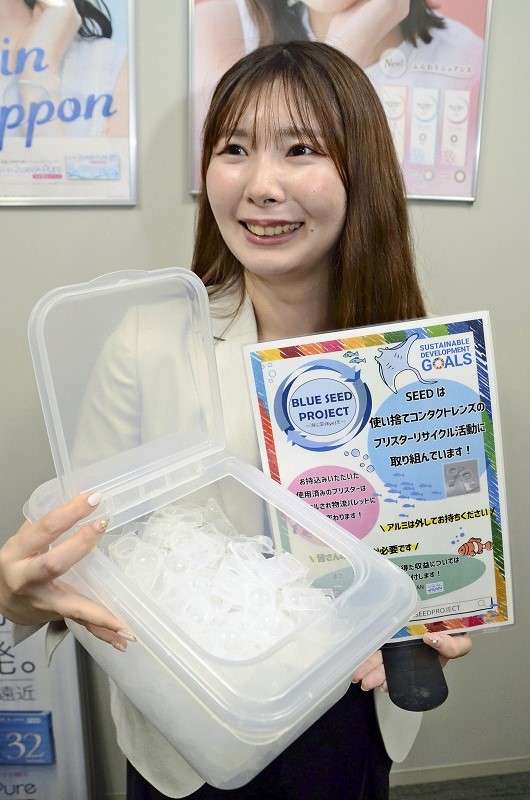Increased recycling of contact lens packaging a sight for sore eyes

A Seed Co. employee holds a box used for collecting disposable contact lens plastic packaging in Chiyoda Ward, Tokyo.
20:00 JST, August 8, 2022
Efforts to collect and recycle the plastic packaging and blister packs of disposable contact lenses are picking up pace across the contact lens industry.
Contact lenses themselves also are made of plastic, but reusing them is difficult because they directly touch the mucous membrane of the wearer’s eyes and would require treatment to prevent infections from spreading. Industry players are therefore trying to reduce plastic waste by collecting the lenses’ packaging and blister packs for recycling.
According to the Japan Contact Lens Association, the value of contact lenses shipped in Japan came to ¥257 billion in 2021, an increase of 20% from 2016. Although there are no statistics indicating the volume of discarded packaging, the amount of waste will likely grow as shipments of contact lenses increase.
Hoya Corporation, a Tokyo-based firm that specializes in eye care, started placing collection boxes at its Eye City chain of contact lens stores in 2010 and collects packaging from all lens makers.
The collection points have been expanded to schools, local government offices, companies and other locations. There are currently about 4,300 such boxes around Japan, and the collected plastic waste is sold to recyclers, who turn it into items including clothing, stationery and auto parts.
Each blister pack weighs only about one gram, but about 70 tons of packaging – a record high – was collected in fiscal 2021. Customers have returned about 460 tons of waste in total since the project began. Despite this, some estimates suggest only about 1% of the quantity sold has been collected for recycling. “We’d like to expand these recycling efforts,” said a Hoya Corporation public relations representative.
Since 2019, Tokyo-based contact lens maker Seed Co. has placed collection boxes at locations including eye doctors and sales outlets. It now has boxes at more than 320 locations and had collected about 3.2 tons of packaging waste by June this year. This plastic is sold to recyclers and all profits are donated to an environmental organization involved in marine conservation.
“The plastic we collect is all thanks to cooperation from our customers,” said Chinika Oikawa, an official from Seed’s promotions office. “We hope this leads to the entire industry becoming more aware of environmental issues.”




